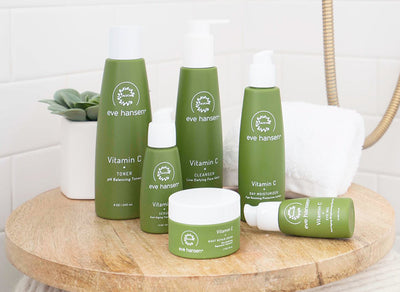
Hyaluronic acid may sound more like a compound you’d find in a chemistry classroom than something you’d put on your skin. In fact, the term “acid” usually implies harmful stripping away, and why would you put anything like that on or even near your face? However, hyaluronic acid, or “HA” as it is often called by its devotees, is actually one of the best skincare ingredients out there. It’s found in all sorts of cosmetics and health products, such as moisturizer, lip gloss, mascara, and more, thanks to its ability to rejuvenate dry skin and lessen the appearance of wrinkles.
The way hyaluronic acid works is quite simple, really: it attracts moisture to the skin, and then it keeps it there, keeping it well hydrated, soft, and smooth. It’s incredibly powerful; hyaluronic acid can hold up to 1000 times its own weight in moisture! And while the human body does produce its own hyaluronic acid, predominantly in its skin tissue, it produces less and less with age, just as we produce less collagen and ceramides. The end result is that skin gets dry and loses its elasticity and radiance as we get older — unless, that is, we use products rich in hyaluronic acid to reduce wrinkles, lines, and sagging skin.
As mentioned, hyaluronic acid isn’t synthetic; it’s a polysaccharide made by the human body to keep skin hydrated and prevent dryness. It actually traps moisture in the skin to keep it soft and smooth, acting as a protective barrier. More than that, though, hyaluronic acid is also found in the nerves, joints, and even the eyes to keep them hydrated and healthy.
This isn’t to say, however, that hyaluronic acid is just for people with dry skin; indeed, individuals with more oily skin can also benefit from products containing it, as they tend to be fairly light. Many creams and moisturizers on the market today contain HA, and after a few weeks of using one of them, your skin can look more supple and younger looking.
Some people are reluctant to use products that contain hyaluronic acid, as they’re worried about it entering their bodies and causing damage. This is not a concern, though, as the HA molecules are too big to get through the epidermis, or the skin’s outer layer. You can safely use any HA-enriched lotion or cream on your face or on any part of your body. It’s gentle, too, so even if you have exceptionally sensitive skin, you should be able to use HA with no issues.
Whether you’ve got dry skin, oily skin, or even eczema, using hyaluronic acid can make your face look smoother and younger. On its own, HA is a thin serum that can be used under your regular facial cream or moisturizer, and it can even be worn under makeup. Simply apply it to clean skin twice a day (in the morning and at night) before using any other products.
In addition to skincare products, you’ll find hyaluronic acid in the ingredient list for all sorts of cosmetics: foundation, lipstick, eyeshadow, mascara, blush, and more. It can make lips look plumper, eye lashes look fuller, and skin more glowing and radiant. In fact, you’d be hard pressed to find makeup that doesn't contain this amazing ingredient.
Many individuals suffer from dry hair and dry scalp, and they can also benefit from using hyaluronic acid. A quality product such as John Masters Organics Honey and Hibiscus Hair Reconstructor contains HA, along with honey, hibiscus, soy protein, wheat protein, and bergamot to moisturize the scalp, make hair follicles stronger, and make hair appear thicker, fuller, and shinier.
We do want to issue a brief warning, however, and it’s this. Because a very small percentage of people may not have beneficial results from using HA, it’s recommended that new users test it on a small patch of skin for a few days before using it more liberally. Most users don't see negative effects from using HA, but a patch test is a good idea, just to be on the safe side.
Hyaluronic acid is remarkably easy to find, as it’s present in so many health care, skincare, and haircare products, and it can be purchased on its own as well. With all of HA’s benefits and hardly any drawbacks, there’s no time like the present to give it a try.
If you're ready to try it for yourself, give our Hyaluronic Serum with Vitamin C a try!
The way hyaluronic acid works is quite simple, really: it attracts moisture to the skin, and then it keeps it there, keeping it well hydrated, soft, and smooth. It’s incredibly powerful; hyaluronic acid can hold up to 1000 times its own weight in moisture! And while the human body does produce its own hyaluronic acid, predominantly in its skin tissue, it produces less and less with age, just as we produce less collagen and ceramides. The end result is that skin gets dry and loses its elasticity and radiance as we get older — unless, that is, we use products rich in hyaluronic acid to reduce wrinkles, lines, and sagging skin.
What It Does
As mentioned, hyaluronic acid isn’t synthetic; it’s a polysaccharide made by the human body to keep skin hydrated and prevent dryness. It actually traps moisture in the skin to keep it soft and smooth, acting as a protective barrier. More than that, though, hyaluronic acid is also found in the nerves, joints, and even the eyes to keep them hydrated and healthy.This isn’t to say, however, that hyaluronic acid is just for people with dry skin; indeed, individuals with more oily skin can also benefit from products containing it, as they tend to be fairly light. Many creams and moisturizers on the market today contain HA, and after a few weeks of using one of them, your skin can look more supple and younger looking.
Some people are reluctant to use products that contain hyaluronic acid, as they’re worried about it entering their bodies and causing damage. This is not a concern, though, as the HA molecules are too big to get through the epidermis, or the skin’s outer layer. You can safely use any HA-enriched lotion or cream on your face or on any part of your body. It’s gentle, too, so even if you have exceptionally sensitive skin, you should be able to use HA with no issues.
Skincare, Cosmetics, and Haircare Too
Whether you’ve got dry skin, oily skin, or even eczema, using hyaluronic acid can make your face look smoother and younger. On its own, HA is a thin serum that can be used under your regular facial cream or moisturizer, and it can even be worn under makeup. Simply apply it to clean skin twice a day (in the morning and at night) before using any other products.In addition to skincare products, you’ll find hyaluronic acid in the ingredient list for all sorts of cosmetics: foundation, lipstick, eyeshadow, mascara, blush, and more. It can make lips look plumper, eye lashes look fuller, and skin more glowing and radiant. In fact, you’d be hard pressed to find makeup that doesn't contain this amazing ingredient.
Many individuals suffer from dry hair and dry scalp, and they can also benefit from using hyaluronic acid. A quality product such as John Masters Organics Honey and Hibiscus Hair Reconstructor contains HA, along with honey, hibiscus, soy protein, wheat protein, and bergamot to moisturize the scalp, make hair follicles stronger, and make hair appear thicker, fuller, and shinier.
We do want to issue a brief warning, however, and it’s this. Because a very small percentage of people may not have beneficial results from using HA, it’s recommended that new users test it on a small patch of skin for a few days before using it more liberally. Most users don't see negative effects from using HA, but a patch test is a good idea, just to be on the safe side.
Where To Find HA
Hyaluronic acid is remarkably easy to find, as it’s present in so many health care, skincare, and haircare products, and it can be purchased on its own as well. With all of HA’s benefits and hardly any drawbacks, there’s no time like the present to give it a try.If you're ready to try it for yourself, give our Hyaluronic Serum with Vitamin C a try!



I bought your vitamin c & h. acid r. serum trio—-please instruct me on how to apply to under eyes and other face wrinkles. Your reviews for this product and great—hope to join the group. Thx……..